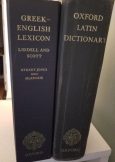 Nothing excites me more than studying, researching and pondering etymology, derivatives, word usage, etc. This little gem, from Owen Barfield’s book History in English Words, was waiting for me in my inbox when I woke up this Sunday morning. It is not enough for me to copy into my commonplace book, I had to share:
Nothing excites me more than studying, researching and pondering etymology, derivatives, word usage, etc. This little gem, from Owen Barfield’s book History in English Words, was waiting for me in my inbox when I woke up this Sunday morning. It is not enough for me to copy into my commonplace book, I had to share:
In the common words we use everyday the souls of past races, the thoughts and feelings of individual men, stand around us, not dead, but frozen intp their attitudes like the courtiers in the garden of the Sleeping Beauty. The more common a word is, and the simpler its meaning, the bolder very likely is the original thought which it contains and the more intense the intellectual or poetic effort which went to its making. Thus, the word quality is used by most educated people every day of their lives, yet in order that we should have this simple word Plato had to make the tremendous effort (it is one of the most exhausting which man is called on to exert) of turning a vague feeling into a clear thought. He invented the new word ‘poiotes’, ‘what-ness’, as we might say or ‘of-what-kind-ness’, and Cicero translated it by the Latin ‘qualitas’, from ‘qualis’. Language becomes a different thing for us altogether if we can make ourselves realize, can even make ourselves feel how every time the word quality is used, say upon a label in a shop window, that creative effort made by Plato comes into play again. Nor is the acquisition of such a feeling a waste of time; for once we have made it our own, it circulates like blood through the whole of the literature and life about us. It is the kiss which brings the sleeping courtiers to life.



I have read the words “commonplace book” more times in the last 8 hours than in all the rest of my life. Great quote!
LikeLiked by 1 person
Ha, yes there is a large thread about it on Twitter. I guess it was in my head.
LikeLiked by 1 person
As usual, a remarkable, fresh, and singular post.
LikeLiked by 1 person
Thank you so much, Valorie!
LikeLiked by 1 person
Funny, I opened your post just because I saw the picture of the awesome Greek-English Lexicon. I used to open it almost daily. Thanks to it, I have added Barfield’s bok to my TBR!
LikeLiked by 1 person
I mentioned the etymology of the word ‘nostalgia’ to my degree class last week, and one of them, who speaks Cornish, pointed out that there’s a word in that language that has a similar meaning – the pain of recalling the past, or longing for home or a particular place: ‘hireth’ – which is the title of a play by Edward Rowe that’s been touring Cornwall this autumn (sadly I didn’t get to see it). It’s about the part played in WWI by Cornish miners. Link to it here: http://o-region.co.uk/theatre/hireth in case you’re interested.
LikeLiked by 1 person
Thanks so much, Simon!
LikeLike
nice find!
two etymological things I’ve enjoyed recently:
Elizabeth Mary Wright (1863-1958) her Rustic speech and folk-lore (1913) (archive.org) and
her husband Joseph Wright (“born Idle,” 1855-1930) his English Dialect Dictionary, e.g., vol. 1 (A-C) opening to the word addle
(all volumes A-Z 1898-1905 most easily findable via archive.org)
LikeLiked by 1 person
Thanks so much. I will take a look.
LikeLike